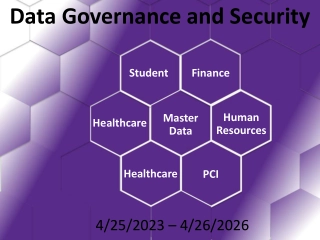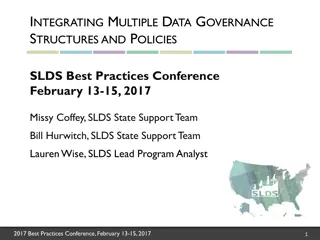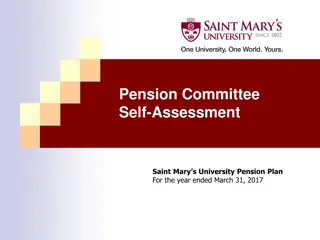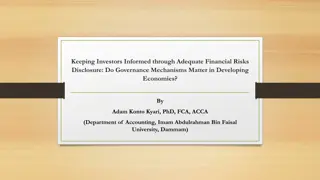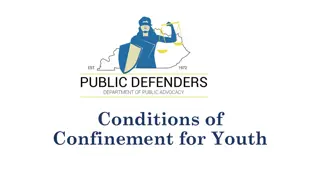Best Practices in Developing Legal Policies & Governance Procedures
Learn essential steps for incorporating a nonprofit corporation in Georgia, applying for tax-exempt status, establishing effective governance structures, and transitioning from a founding board to a governing board. Discover the importance of a strong organizational foundation in ensuring the academic success and sustainability of charter schools.
Download Presentation

Please find below an Image/Link to download the presentation.
The content on the website is provided AS IS for your information and personal use only. It may not be sold, licensed, or shared on other websites without obtaining consent from the author. Download presentation by click this link. If you encounter any issues during the download, it is possible that the publisher has removed the file from their server.
E N D
Presentation Transcript
Best Practices in Developing Legal Policies & Governance Procedures Holly Green Education Advisors, LLC holly.green@comcast.net
Getting Started: Your Incorporation Checklist Requirement of incorporation as a Georgia nonprofit corporation is for start-up charter schools only; Contact County Clerk s Office to find out how to publish Intent to Incorporate Reserve a Name through Secretary of State s Database www.sos.state.ga.us File Articles of Incorporation with Secretary of State s Office Contact City Clerk s Office for Business License Apply for FEIN www.irs.gov Prepare bylaws The contents of this presentation are for informative purposes only and should in no way be construed as legal advice. Attendees are advised to consult an attorney regarding these matters.
Getting Started: Your Incorporation Checklist Apply for Federal Tax Exempt Status www.irs.gov/charities www.irs.gov/charities Apply for Georgia Tax Exempt Status & State ID Number www2.state.ga.us/departments/dor Register as a Charitable Organization Check Secretary of State s website (www.sos.state.ga.us) as some organizations are exempt www.sos.state.ga.us
Effective Governance Board Structure and Strategies for Successful Governing
From a Founding Board to a Governing Board GOAL: Transition to a board who governs and leaves day to day management of the school to school personnel and is more concerned with ongoing planning and policy development Founding board usually composed of individuals who are friends or close personal associates who plan and design the school in a very hands-on fashion; Different sets of skills and different level of time commitment; Level of objectivity; Possible conflicts of interest; Transition plan for any founding board members who will sit on governing board;
Importance of Strong Organizational Foundation The board provides the vision, mission and strategic plan of the school; Provides oversight and objective decision making; Promote the charter school s mission; Is ultimately responsible for school s financial health; Fundraising efforts; Hire and manage school leader; Assures compliance with state and federal laws and rules; Most importantly, board s role is to focus on the academic success of students and sustainability of the organization
Boards Oversight Responsibilities Set the school s general policies and curriculum; Ensuring proper financial management by implementing an annual budget, developing financial procedures and internal controls; Hiring and evaluation of school s principal and teaching staff, sets salary and compensation levels; Approving personnel policies and oversees their implementation in the school; Assuring that the school fulfills its charter agreement
Best Practices: Governing Board Provide knowledgeable and dedicated leadership. Identifies priority needs and sets short term and long-term goals; Establishes a procedure for the selection of new board members and for their orientation and training; Recruit board members who are not just figureheads but truly understand the time commitment and level of expertise required to serve on the board; Selects the best person available as the school leader and supports him or her as they perform the day to day business of running the school, but provides oversight, training and feedback Adapted from The Volunteer Board Member in Philanthropy, National Charities Information Bureau
Governing Board Recruiting Efforts Recruitment process is critically important to compose a board with the necessary level of expertise; Transition plan for which founding board members will remain on governing board and orientation and training of new board members; All governing board members must clearly understand the expectations within the charter, are willing to implement the school s vision and have a clear plan for conducting effective oversight of the academic program; Nine to eleven members in early process of opening school and should achieve a size of eleven to fifteen members at the end of school s first or second year in operation
Governing Board Recruiting Efforts Financial Management Expertise Fundraising Expertise Academic Expertise -Curriculum & Instruction, Assessment Human Resources Expertise Governance & Management Real Estate Expertise Legal Expertise
Legal Responsibilities of Board Directors Duty of Care Must exercise reasonable care when making a decision as a steward of the charter school Active participation in board meetings; Oversight of committee structure to make sure all board members can rely upon committee s work and decision making process; Review meeting minutes prior to voting; Maintain general knowledge of books and records; Investigate and take action when necessary to deal with officer or employee theft or mismanagement
Self Assessment for Duty of Care Do board members regularly attend board meetings? Do board members actively participate in meetings? Are accurate minutes recorded? Is good business judgment used in all decision making?
Duty of Loyalty Standard of faithfulness to the best interests of the school; Board members must not use their position, or the charter school s assets or information obtained as a member for personal gain; Conflicts of interest policy and annual questionnaire; No loans of charter school assets to board members; Strict adherence to charter school s governing documents in operation of school
Duty of Faithfulness Compliance with state and federal statutes; Open Meetings Act and Open Records Act Corporate filing requirements; Comply with charter and work with authorizer; Ensure financial health of organization; Use of outside consultants when necessary
Best Practices: Governing Board Fulfill fiduciary duty by having a clear conflict of interest policy and board ethics policy which addresses the following: Not accepting money or items of value because of any purchase, sale, investment or loan nor shall any board member or school management have any pecuniary interest in the purchase, sale, investment or loan; No relationship or interest in a vendor that would present a conflict to the board s best interests; Should not serve on boards or be employed by a competing organization; Should not accept gifts from vendors; Abstaining from voting or consideration where necessary
Governance Best Practices: Bylaws Board Members Officers Meetings Location and number of meetings per year; Policy on specially called meetings; Compliance with Open Meetings Act; Quorum and voting rules Number; Qualifications; Selection Process; Process for filing vacancies Removal of board members; Term Limits; General Powers; Fees and Compensation Titles and job descriptions of officers; Selection Process; Procedures for Filling Vacancies; Term Limits; Rotation Process Adapted from NACSA's Issue Brief: "Good to Govern: Evaluating the Capacity of Charter School Founding Boards
Governance Best Practices: Bylaws Staff Committees Miscellaneous Who reports to the board; Is the school leader considered a voting or non-voting board member? Beginning and end dates of fiscal year; Following Robert s Rules of Order; Amendments; Assessment of board performance Procedure for creating a committee or special task force; Number and purpose of board committees; Job descriptions for each committee; Adapted from NACSA's Issue Brief: "Good to Govern: Evaluating the Capacity of Charter School Founding Boards"
Governance Best Practices: Effective Board Meetings Committee process is critical to an effective board; Include committee structure in bylaws with descriptions and process for how committee work is treated by the full board; Recommended Committees- Academic Excellence Committee; Finance Committee; Governance Committee
Selecting the Right School Leader May be the most important job for the governing board; Positive and close working relationship between the school leader and the board is critical; Charter school leaders do not have the infrastructure in place as in a traditional school; As a result, duties everything from finding facilities, hiring staff, recruiting and orienting families, developing budgets as well as working with the governing board, local community and authorizing board; Traditional school leadership training programs are not designed to prepare charter school leaders for the responsibilities that go beyond those of a district school principal
Pre-Operations Planning Policy Development and Other Key Documents
Service Contracts Provide valuable services and necessary expertise but oversight and involvement with outsourced services is not only a good practice, but necessary to preserving tax exempt status; Tax Exempt Status dependent upon the school being organized and operated for the benefit of the public and not for the benefit of the service provider; Board may not delegate its responsibility and ultimate accountability for the school s operations to a management company
Protecting Tax-Exempt Status Is the board still ultimately in control and continuing to exercise its fiduciary responsibility to the school? Is the board truly independent? Comprised of community leaders and education professionals vs. management organization appointed board; Does the board hold regular meetings; Conflict of interest policy requiring board members to disclose all financial interests they have in any service provider; Oversee the management company and retain the ultimate responsibility for meeting the terms of the charter; Maintain fiscal responsibility
Protecting Tax-Exempt Status Was the agreement an arm s length transaction which includes terms for the benefit of the school rather than the service provider? Contract Terms: Length of contract-must balance the management company s interest in a long-term contract with the school s need for flexibility in changing companies; Cannot contract away the operation and management of the school to a management company; Clear expectations on who is performing the day to day operations of the school; Beware of anti-compete clauses;
Protecting Tax-Exempt Status Was the agreement an arm s length transaction which includes terms for the benefit of the school rather than the service provider? Contract Terms: Fees must be reasonable and commensurate with services provided; Fee structure should not be based on total income but rather the market rate for such services; Termination provisions that do not unreasonably restrict the options of the school;
Protecting Tax-Exempt Status Other Issues: Name branding While not necessarily bad, it does make terminating the relationship more difficult and might be an indicator of private benefit depending upon the level of branding Ancillary Agreements and Services must also be negotiated at an arm s length and not result in contracts of adhesion
Best Practices for Contracting with Service Providers Encouragement of Competition; Open and competitive bidding process; Negotiated bids should have documentation as to why the school s interests are best served by the manner proposed Contract terms must set clear performance standards and expectations; Open and full disclosure of contracts and ancillary documents; Performance Expectations and Penalties; Effective contract monitoring; milestones for performance expectations Adapted from "Trends and Best Practices for Education Management Organizations" by Guilbert C. Hentschke, Scot Oschman & Lisa Snell
Contracts with Parents and Students Introduces concept of innovation and academic accountability to parents; Clear performance expectations for school and students; Parent involvement expectations; Uniform requirements; Rules for conduct and consequences for rule violations
Hiring of Teachers Define employer in charter petition; Governing board or management organization for start-ups, usually district for conversions; May use state salary schedule structure Form on www.doe.k12.ga.us; Contracts should address: Term; Salary structure; Benefits; Certification requirements, if any; Termination provisions; Public school employment oath of allegiance; Clear performance expectations
Good Risk Management Practices are Key to Charter School s Survival Board s legal duty to conserve and protect the assets of the charter school; Much more than just purchasing insurance; Must identify risks and uncertainties and develop sound plan to minimize these risks; Good policies and board and management structure are key to a sound risk-management plan
Importance of Good Board Structure and Policies Importance of recruiting quality board members with the necessary expertise; Board training Strong conflict of interest policy; Documentation and thorough board minutes; Research insurance options; Conversions need to see if district s umbrella policy will cover them Indemnification provisions in bylaws; Strong financial controls; Self audits to identify problems on the front end
Risk Management Self Assessment The school has written employee policies that have been reviewed by an attorney and are up to date; The school has a job application reviewed by an attorney and trains staff members who conduct job interviews on proper techniques; The school recruits widely for open positions; The school has procedures in place for handling the discipline and termination of employees; The school uniformly follows its policy for discipline and terminating employees; The school has written job descriptions and performance expectations; 1. 2. 3. 4. 5. 6. Adapted from "Helping you Keep Your Nonprofit Legal" by The Nonprofit Law Center
Risk Management Self Assessment Contracts with employees, in consultation with an attorney, include termination at will provisions; Human resources staff review employee benefit plans regularly; All personnel records are kept confidential; Board members know and understand their fiduciary and other responsibilities; All board members understand the importance of not engaging in self dealing or other conflicts of interest Adapted from "Helping you Keep Your Nonprofit Legal" by The Nonprofit Law Center


